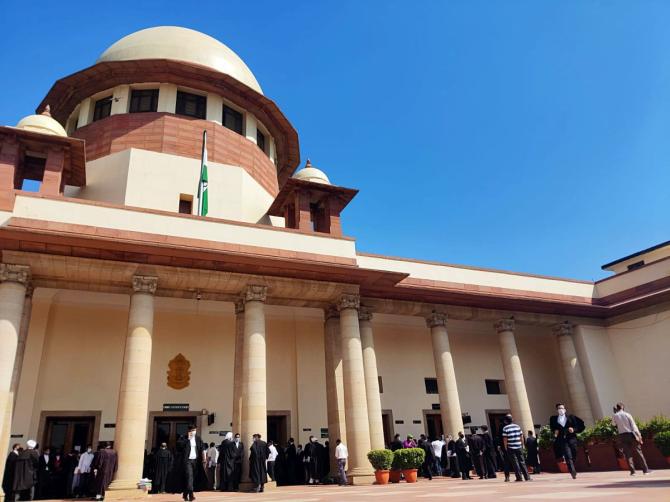The Supreme Court sought the response of the Andhra Pradesh government and others on Wednesday on a plea moved by a firm that publishes the leading Telugu daily Eenadu, challenging a government order "aimed" at increasing the sales of the Sakshi newspaper, which is published by another company allegedly owned by Chief Minister YS Jagan Mohan Reddy.

A bench comprising Chief Justice DY Chandrachud and Justices PS Narasimha and JB Pardiwala took note of the submissions made by senior advocate Mukul Rohatgi, who appeared in the matter on behalf of Ushodaya Publications, which owns Eenadu, that the GO violated the fundamental rights to equality and freedom of speech and expression.
The firm, which has moved the appeal against an Andhra Pradesh high court order that refused to stay the impugned GO, alleged that allowances are being given to village and ward volunteers in the southern state to buy Sakshi.
"The state government has also said Eenadu does yellow journalism and hence, do not go for it. This is a state propaganda," Rohatgi argued and referred to the remarks made by the chief minister against Eenadu.
The bench issued a notice to the state government and others and fixed the case for further hearing on April 10.
"This is a classic case where the respondent -- the state government at the instance of respondent number 9 (the chief minister) -- has made every attempt to curtail freedom of press, including freedom of circulation of the petitioners, in an arbitrary exercise of jurisdiction."
"The constitutional rights guaranteed under Articles 14 and 19 of the Constitution of a newspaper (petitioner number 1) are infringed by the abuse of the official position by respondent number 9, who is making every attempt to strangulate the operations of Eenadu, published by petitioner number 1," Ushodaya Publications has said in its plea filed through lawyer Parmatma Singh.
The petition has challenged the two high court orders by which the plea seeking the suspension of the GO dated December 8, 2022 was rejected.
"The high court failed to appreciate that the aforesaid GO was ex-facie violative of Articles 14 and 19 of the Constitution. The objective of the said GO was to provide gram volunteers and functionaries with 'one widely circulated daily newspaper'," the plea said.
It alleged that the widest circulated Telugu newspaper in the state, Eenadu, was deliberately kept out on account of the fixation of an additional financial support of Rs 200 per month for village volunteers and ward volunteers.
"It is relevant to note that Eenadu (petitioner) has a monthly subscription at the rate of Rs 207.5 and the newspaper published by R-7 (Sakshi) has a monthly subscription rate of Rs 176.5. It is relevant to note that the newspaper with the third widest circulation, that is Andhra Jyoti, has a monthly subscription rate of Rs 207," the plea has said, adding that the amount of Rs 200 has been fixed by the state government so that the village and ward volunteers do not purchase Eenadu.
The GO was even otherwise bad in law and this is evident from providing the volunteers with the newspaper that gives information on government schemes and to counter a wrong propagation of the said schemes by any media organisation or individual.
"The state government has not given a choice to the readers of subscribing to a newspaper of their own choice and has forced them to buy Sakshi, which promotes the political agenda of a particular political party, and not to subscribe to any newspaper that is critical of the state government," the plea has said.
Besides seeking a stay on the operation of the high court orders, it has also sought a direction to the Audit Bureau of Circulations of the Andhra Pradesh government to "suspend auditing the circulation of Sakshi newspaper for the period from July-December, 2022 and for subsequent period".
The GO sanctioned Rs 200 per month from the state funds as an additional financial support for each "gram volunteer and ward volunteer" to enable them to purchase one widely circulated Telugu newspaper.
The Andhra Pradesh high court had said there was no material showing that the GO instructed the gram volunteers or ward volunteers and village secretariats or ward secretariats to subscribe to Sakshi.











 © 2025
© 2025